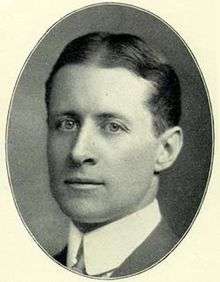Edgar Viguers Seeler
| Edgar Viguers Seeler | |
|---|---|
 | |
| Born |
November 18, 1867 Philadelphia, Pennsylvania |
| Died | October 26, 1929 |
| Resting place | West Laurel Hill Cemetery, Bala Cynwyd, Pennsylvania |
| Residence | Philadelphia, Pennsylvania |
| Education |
Central High School Massachusetts Institute of Technology |
| Occupation | Architect |
| Spouse(s) | Martha Page (Laughlin) Seeler |
| Parent(s) |
George Washington Seeler Anna Maria (Viguers) Seeler |
Edgar Viguers Seeler (1867–1929) was an American architect.
Biography
Early life
He was born on November 18, 1867 in Philadelphia, Pennsylvania.[1][2] His father was George Washington Seeler (1839-1911) and his mother, Anna Maria (Viguers) Seeler (1838-1868).[1] He graduated from Central High School in 1884.[1] He attended night classes at the Philadelphia Museum and School of Industrial Art.[1] He then graduated from the Massachusetts Institute of Technology in 1890.[1] He then attended the École nationale supérieure des Beaux-Arts under the tutelage of Victor Laloux (1850-1937) from 1890 to 1893.[1]
Career
Back in the United States, he established his own architectural practice at 328 Chestnut Street in Philadelphia.[1] From 1893 to 1898, he also worked as an Assistant Professor of Architectural Design at the University of Pennsylvania.
In 1901, he designed the First Baptist Church located on the corner of 17th Street and Sansom Street in Philadelphia in Gothic Revival style.[1] He designed the Real Estate Trust Company building at Broad Street and Chestnut Street in 1903-1904.[1] In 1905, he designed the private residence of Dr. Henry Carey Register, named "Clovelly", located on Old Gulph Road in Ardmore, Pennsylvania.[1] He also designed the Philadelphia Bulletin Building located at 1315-25 Filbert Street in 1906-1908, and added to it in 1915-1916.[1] Arthur Ingersoll Meigs (1882-1956) was his apprentice from 1905 to 1906.[3]
In 1912, he designed the Curtis Building for the Curtis Publishing Company located in North Washington Square.[1] Later, he designed the Penn Mutual Life Insurance Building on the corner of 6th Street and Walnut Street for Penn Mutual in 1916.[1] Two years later, in 1918, he designed four hundred houses in Eddystone, Pennsylvania for the U.S. Housing Corporation.[1]
He was a member of the American Institute of Architects and the T-Square Club, where he served as President in 1898.[1] He was also a charter member of the Society of Beaux Arts Architects.[1] Additionally, he was a member of the Pennsylvania chapter of the Sons of the Revolution and the Fairmount Park Art Association.[1]
He retired in 1926.[1]
Personal life
He was married to Martha Page (Laughlin) Seeler (1871-1938).[2] He resided at 1828 Locust Street in the Rittenhouse Square neighborhood of Philadelphia.[1] He died on October 26, 1929.[1][2] He was buried in the West Laurel Hill Cemetery in Bala Cynwyd, Pennsylvania.[2]